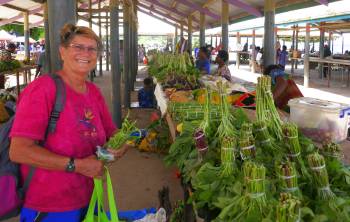
Soggy Paws Sherry, at Kavieng market
|
Cruising Info HomeGeneral Cruising Info Pacific Ocean Cruising Indian Ocean Cruising Cruising Recipes General Info UpProvisioning Pages Related Pages Cruising PNGCruising Solomon Islands |
PNG & Solomons Provisions
 Soggy Paws Sherry, at Kavieng market |
We cruised to Papua New Guinea and the Solomon Islands from Indonesia in January, 2019. There were only 4 boats doing that route at the time (it's the easiest time for going east, using the NW winds). But most boats will arrive in the Solomons and PNG coming from either Vanuatu or Australia. We did not sail as far east as Honiara, so our first‑hand information includes only as far as Gizo, Munda and Noro in the Solomons, and none of the mainland of PNG.
Since you can get just about anything you want in Australia, it's a good idea to stock up on favorite foods there. Those coming from the Philippines would also do well to stock up.
We left on this journey from Papua, Indonesia, where provisioning is, well, an adventure. In Sorong, the largest town in the Raja Ampat area, we shopped mostly at Saga. There we found cheeses, butter, powdered milk, frozen and fresh chicken, frozen meat, and lots of "fun food" like chips, nuts, crackers, and cookies. Saga provides food for the "phinisi" live‑aboard dive boats that abound in Raja in November through March, and need "western food" for their clientele. At our clearance port of Biak, in northeastern Papua, we did a final stock‑up of basics like sugar, flour, rice, oats, eggs, plus any dairy products we were low on after leaving Sorong, but the shops in Biak weren't nearly as good as those in Sorong.
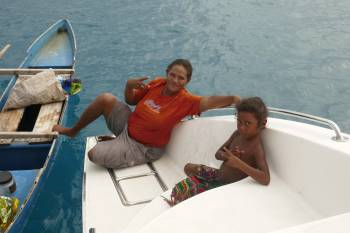 Rosina traded veggies for kid clothes in Ninigos, PNG |
Indonesia's Papua has tough laws about liquor, so it's best to buy beer, wine and spirits elsewhere, either Philippines, Malaysia or Australia. We did find beer in both Solomons and PNG, and, as we were running low, had to buy it at about US$1.50‑2.00/can.
Trading in PNG and the Solomons is a way of life in the villages and outlying islands. If you like visiting places like this you need to think about stocking up with trade goods. In terms of food, the most requested items were sugar, rice, and biscuits (what Americans call cookies). We have also traded instant coffee packets, tea bags, flour, canned meats, canned tuna, and small bottles of cooking oil. We try NEVER to buy palm oil. It's our protest against Asian palm‑oil plantations wiping out the native forest and habitat for orangutans. Soap, toothpaste, toothbrushes, shampoo, and clothing detergent are also popular. We never give out alcohol or cigarettes, though we have been asked. You'll be trading these items for local fruit, like a hand of bananas, a few limes, a bunch of green veggies, sweet potatoes, and papaya. Most villagers trade on an "as you wish" system, where they will happily accept whatever you offer in exchange for their produce. With that in mind, it's good to carry either small packaged quantities of sugar, or be prepared with zip‑locking baggies to put some rice into. Sometimes we haven't had convenient small quantities of a food item the villagers want, but they are happy with T‑shirts of any size, hats, sunglasses (stock up on cheap ones!), and reading glasses (ditto). Kids like school notebooks and pens. Other popular trade items are light fishing line and small hooks, rubber for sling‑shots and spear‑guns, old masks and fins. Containers like drink bottles with caps, plastic storage tubs and boxes, etc. are appreciated as they live in a culture without such items, and in fact still wrap veggies in banana leaves and hand‑woven grass baskets. Gotta love it! Not much plastic here yet! (This is reflected in the relatively trash- and bag‑free water!)
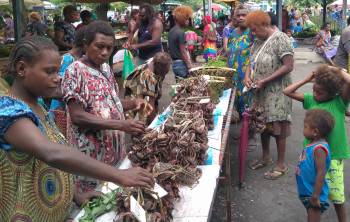 Mud crabs by the bundle. Rabaul market, PNG |
It is our policy to never hand over "gifts" to children or adults who come up to us simply asking for hand‑outs. We always encourage people to trade something. The southern rally route through Indonesia has been spoiled by too many hand‑outs by well‑meaning but poorly informed cruisers who distribute lollies, school books, coins and balloons willie‑nillie. This has created to a "gimme, gimme" culture that is not fun to sail through. Encourage kids to return home to bring something from the garden to trade. Or, if they have nothing, or it's too far, then engage them in English speaking or singing, ask about their family and friends and church. After such an exchange, you might give a gift to them as a thank you for teaching you about their culture.
Cooking gas/Propane: Both PNG and the Solomons use the standard US/Aus/NZ reverse‑thread propane fittings. We filled our propane bottles in Rabaul at a petrol station on a side street, towards the water, from the market. You need a minibus to get from the Yacht Club to Rabaul. In Solomons we filled in Noro, just next to the BSP bank, and a 30‑second walk from the northern‑most petrol dealer dock on the waterfront. Both were fast and efficient, though weekends, as usual, can slow things down.
| Is this useful? Buy us a beer! |
Food shopping in PNG: There's no "shopping" per se in the Ninigos and Hermits, but that doesn't mean there's no food! We traded for: fresh fish, lobster, fresh chicken (plucked and cleaned), eggs (which may or may not be fertile), snake beans, several varieties of sweet potato (called "kaokao"), eggplant, pumpkin, tomatoes, leafy greens, papaya, limes, oranges, pineapple, plaintain and bananas. Bring LOTS of trading items, as the Ninigoans (especially) need a lot: clothes (especially for children), toiletries, sugar, spices, salt, rice, reading glasses, batteries (especially D size), fins, masks, fishing line & hooks, pens, reading matter (books, old magazines), etc, etc. They will also buy bigger ticket items like solar panels, charge controllers, solar batteries, GPSs, etc. Supply boats no longer stop in the Ninigos, so they're pretty desperate. It costs them a 200 liter drum of fuel each way (call it US$400) to get to the mainland (Wewak) or Manus, and those towns are so small that there's little to buy.
The first town we arrived at in PNG was Kavieng, in northern New Ireland. We did our clearance formalities here, and anchored across the bay at the Nusalik Resort, which is yacht‑friendly. From Nusalik there are fiberglass "banana boats" that shuttle to and from the town market and wharf for 50 Kina (about US$14) which is the BOAT price, so can be divided amongst the travelers. Sometimes we took our own dinghies across and tied to the Dive Kavieng dock (with their permission, of course). There is no easy place to leave a dinghy near the market beach. There are mini-busses that ply the main road from the dive shop and went up the hill to the main street of town with ATM, food shops, customs, and hardware stores. Everything is compact and easy to find. Kavieng is not a big place! The market by the waterfront seems to specialize in tobacco from the highlands and betel nut and lime. We did find green beans, watermelon, limes and papaya. Not a very big market!
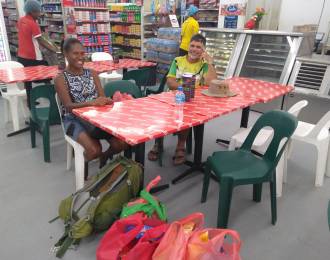 The Kaibar snack corner at Anderson's, Kokopo |
Kavieng has an ATM on the left at the top of the hill when approaching from the waterfront. The big Joe's supermarket will take credit cards, but with a surcharge of 2%. Joes' also has the best ice cream shop!
Another town we sailed to was Rabaul, in Eastern New Britain. Here we took a mooring at the Rabaul Yacht Club, which means taking a K1 ($.30) minibus to Rabaul market and shops. In town there are several supermarkets (Chinese shops) and hardware stores, like Barlow. We found most things we wanted at Soho, right across from the market and bus stop, but they don't have much cheese other than sliced (see Kokopo, below). The fresh markets in both Kokopo and Rabaul are great, filled with vendors selling peanuts (in the shell only), papaya, pineapple, lettuce(!), tomatoes, greens and the ubiquitous sweet potatoes in all their shapes and colors. Plus fish and crabs and squid, of course. There is no bargaining, as prices are clearly written onto each pile or item.
The ATMs at BSP in Rabaul are often out of cash, or will only dole it out in small amounts, meaning you have to pay the service charge each time. We have had good luck using our credit cards at Soho, and asking for cash back. You can often get up to K500 with no surcharge. Once we asked for K1,000 and paid K18, which is still a bargain over the K15/withdrawal from the ATM.
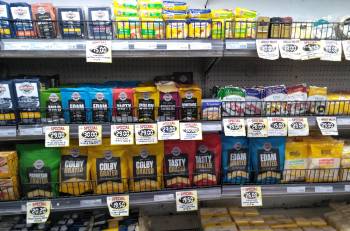 Cheese! Could be Aus, but it's Anderson's Kokopo |
For bigger shops, and more choices, including bigger hardware stores, computer shops, solar panel shops and more imported items, you need to take a bus to Kokopo, about 1 hour's drive along the coast road (if it's not flooded) or 1:30 via the ridge road. Cost is 4 kina each way. You get dropped at the HUGE market, but then it's a long walk to the south to the shops, which are spread out for miles. Andersen's is the closest and best grocery store with meats and cheeses and a "Kaibar" snack area with really good meat pies for 6 kina, and the usual assorted cold drinks. They also have some meat "stew" dishes which we have found to be 30% fat. Andersons' takes credit cards, and will give a small amount (like 200 kina) of cash back, not as willingly as Soho in Rabaul.
The fresh market in Kokopo is huge and is worth time just exploring. September marks the beginning of mango and avocado season and only gets better in the following months. The long mangoes are the sweetest, the round ones more astringent. Avocados here are ripe when barely soft. They turn brown and overripe very fast. After shopping in Kokopo, the challenge is to schlep it all back on the long bus ride, then change to a small bus to the yacht club.
Looking back on PNG provisioning, Rabaul and Kokopo have the best choices of "western" food. In addition to the aforementioned meat and cheese, we also found broccoli, lettuce, feta cheese, carrots and apples.
In western New Britain we visited Kimbe, and anchored off the Liamo Reef Resort which was very welcoming to yachts. The 2 big grocery stores in town are Welcome (previously Anderson's) and Papindo. There is a Kaibar (snack/lunch bar with hot dishes and meat pies) at Papindo on the 3rd floor. We found fresh and frozen meat and chicken and Australian hard cheeses at both. There were no "luxury" cheeses like Brie or Blue. Strangely, after so much coconut cream and milk products in SE Asia, we could not find UHT or powdered coconut cream/milk. It's an item I would stock up on, when coming here!
The fresh market in Kimbe is huge and well stocked with lettuce, cucumbers, tomatoes, greens, green beans, papaya, bananas, pineapples and, in season, avocados, mangos, passion fruit and guavas. Eggs are available at the fresh market and in the big shops.
Our northern-most stop was at Manus, where we anchored off the Naval Base and got a ride to Lorengau with the customs men. There is a fresh market, of course, with the usual pineapples and papaya. There was also a large selection of grapefruit. The greens looked pretty wilted except for bunches of kankung (which can be kept fresh on the boat in a jug of water, much like cut flowers) but there was no cabbage or lettuce. We did find small tomatoes and green peppers (all priced by the unit up to 1.5 kina each, or 50 US cents) and fat cucumbers priced up to US$2 each. We were stocking up to head west into Indonesia and were sorry to find both the big Papindo grocery store and a big Chinese store sporting more bare shelves than goods. There was no pasta, no cheese, no exotic fruits like apples, and no eggs in the whole town. Apparently the supply ship from Lae (on the mainland) comes once a month, and we must have hit the end of the cycle. Strangely, we did find imported packets of dried coconut cream. This, on an island that brags of the country's largest coconut plantations!
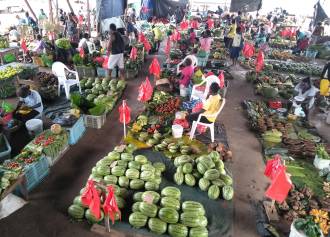 Gizo fresh market, under old shelter |
Food Shopping in Solomon Islands: We only got to the Western Province of the Solomon Islands, with the 3 small towns of Gizo, Noro and Munda. All three towns have ATMs, which you'll need, as credit cards are only accepted at Blue Container Shop in Noro.
In general, at the fresh markets in the Solomons, the main vegetables (other than the betel nut and lime) are long green beans, snake beans, bok choy, small green peppers (that was a surprise), lettuce (another surprise!), tomatoes, sweet potatoes, and eggplant. Pumpkins can be found sometimes. Fruits are limited to bananas, watermelon and papayas, with an occasional pineapple. Mangos and avocados may come in season in September, but we were too early for that. "Nari" nuts (known to us from Indonesia as kenari nuts) are sold either whole, or shelled and roasted. Not cheap, but yummy nuts, good for snacking or baking. We did not find shelled peanuts except in grocery stores in cans.
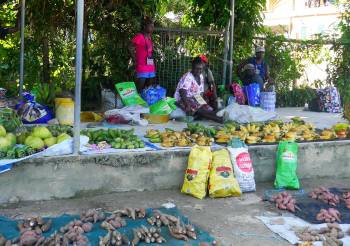 Munda market, a tiny affair by Gateway Resort |
In Gizo, the best place for your dinghy is at PT019 restaurant, which is at the western end of town. They serve good lunches and dinners on weekdays only. Closed Sat and Sun, but you can still tie up there. All the shops in town are closed Sunday, and at noon on Saturday if they open at all. The one main street takes you past lots of small shops and some bigger Chinese grocery stores. On the water‑side, the "Yamaha" shop has a worthwhile hardware section and a small food section with frozen chicken and beef sausages. They have some cheese selection, and an interesting assortment of imported food. Nearby is the "Bulk Shop" that carries a variety of Australian cheese and butter in the fridge. Basics, like flour and sugar are available in all the Chinese shops. The BSP and ANZ banks are both located on the main street. ATM fees at ANZ are 50% higher than at BSP. Maximum withdrawal is SD4000, or about US$450. The grocery stores don't take credit cards, so you need cash.
Gizo has a good market (soon to be relocated under a big new enclosure, which has been finished for months!) at the eastern end of town near the Gizo Hotel. You can get green peppers by the dozens, cucumbers, some tomatoes, greens like kankung, bananas, plantain, some pineapple, and lots of papaya. Occasionally they have lettuce. One Saturday afternoon when all the veggie vendors were gone, there were tables laden with yellow‑fin tuna, each selling for about US$5. Fresh and yummy!
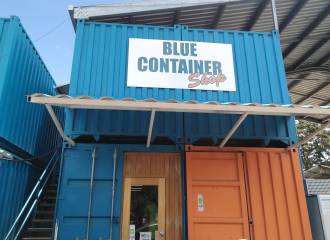 Blue Container: Aus prices, but good stuff, Noro |
Munda is about 2 square blocks, with a BSP bank and ATM, and about 4 Chinese shops with food and a variety goods and some hardware. There is one Bakery, one tiny cafe, and a tiny open market near the wharf for Agnes Gateway Resort (where you can tie your dinghy). The plantains and sweet potatoes dominate until other villagers arrive with greens and lettuce and tomatoes. Prices are not marked here, so it's best to know what's fair, though if you listen to the women selling to other islanders, you'll have an idea. Most produce is laid out in small piles that will run you SD5‑10.
Noro is an odd town, with BSP bank, Chinese shop with basics, a couple small restaurants and the market along the waterfront. It also has the best fuel dock, with good prices if you need 200 or more liters at one time. Inland (a long walk slightly up hill) you'll find 2 hardware stores, Island Enterprises and the "Chinese Hardware" or Apco close to each other. A bit farther along, but an easy walk from the hardware stores is Blue Container Shop. This is an innovative shop built from, you guessed it, several blue shipping containers. They carry all sorts of Australian imports at Australian‑plus prices. The best deals here are the "Clearance shelves" with good bargains if you don't mind near-pull-date-items. Lots of cereals, cheeses, sauces, pickles, etc. They take credit cards with no surcharge!
The open market on the waterfront in Noro seems to attract a lot of canoes and small powerboats, but the pickings aren't great.
Provisioning Pages:
Related Pages: Cruising PNG | Cruising Solomon Islands
Cruising Info:
Top Level: Home | Destinations | Cruising Info | Underwater | Boat Guests | Ocelot | Sue | Jon | Amanda | Chris | Site Map | Make a Comment
|
If our information is useful, you can help by making a donation |
Copyright © 2000‑2025 Contact: Jon and Sue Hacking -- HackingFamily.com, svOcelot.com. All rights reserved.